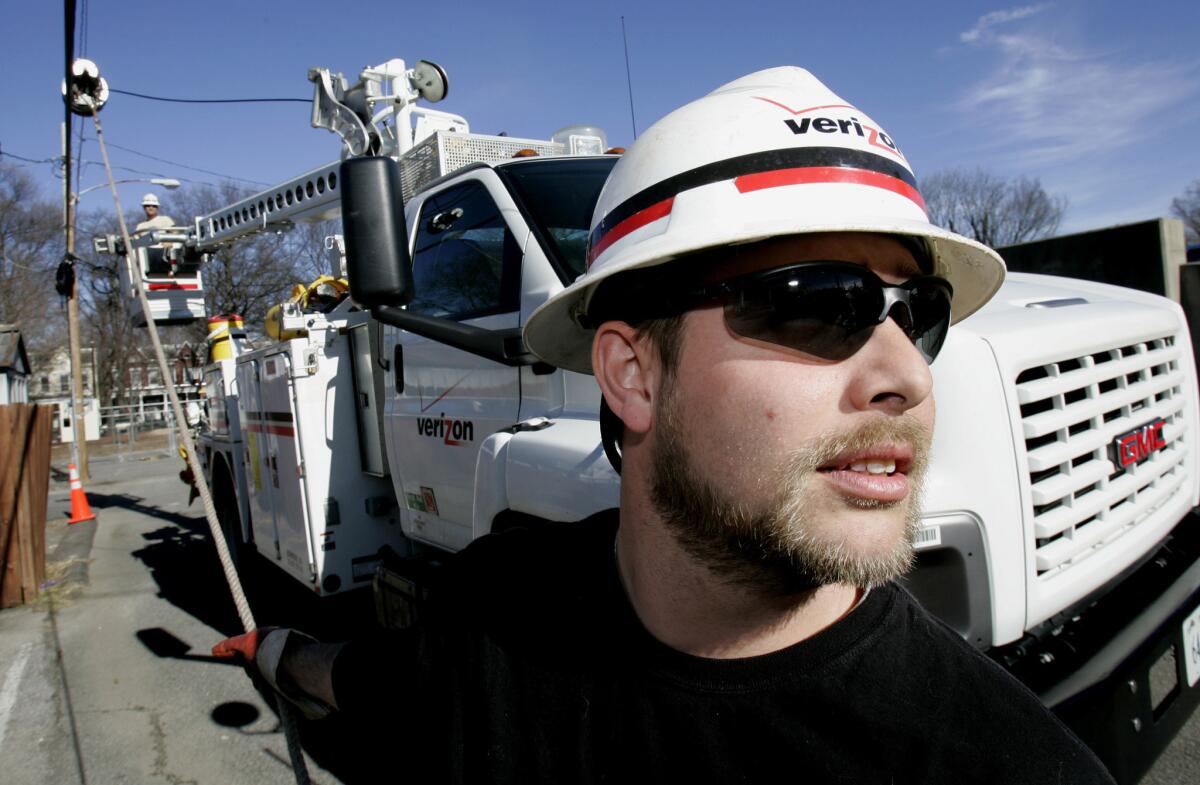America’s broadband blues

- Share via
Over the last year, America’s broadband report card, in my estimation, has gone from a D to a C-. Although the U.S. has definitely shown signs of improvement in high-speed Internet access, the achievements have been mostly in mobile broadband, not the wired broadband we need for children everywhere to reliably access their homework, for towns to keep and attract jobs, and to generally support a 21st century digital economy and a modern education system.
A recent series of opinion pieces, jumping off from a fairly positive White House assessment of broadband progress, trumpeted the case for feeling good about Internet availability in America. For example, Richard Bennett of the Information Technology and Innovation Foundation wrote in the New York Times that we’ve moved all the way from 22nd in international broadband rankings to eighth.
For those who are uninspired by the rallying cry “We’re No. 8,” nearly identical commentaries from honchos at Verizon and Comcast appeared in the Philadelphia Inquirer and again in the NYT to assure us that we lead the world in 4G LTE wireless deployment, and we beat Europe in 100-megabit wired networks.
What they didn’t say is that U.S. companies do not generally offer these speeds to customers even though the networks theoretically support them, so our superiority really doesn’t do us much good. Nor does leading the world in 4G wireless capability.
According to Bureau of Labor statistics, smartphones do not appear to generate productivity gains, whereas access to wired broadband does. Although no one is sure why this is the case, it certainly does not help that the two biggest cellphone service providers, AT&T; and Verizon Wireless, make their already expensive 4G data plans useless as a serious tool by imposing significant limits on data and hefty overage fees.
We don’t do broadband report cards so we can pat ourselves on the back. We do them because affordable high-speed access to the Internet has become as critical to success in the 21st century as electricity and telephones were in the 20th century. The few locales in the United States that qualify as “Gigabit cities” — where the Internet can be accessed at 1 gigabit a second — have seen almost immediate economic and social benefits, while communities without broadband struggle to create jobs.
What about the millions of people in America that the federal government finds have no broadband options or aren’t making use of the options they do have? The industry seems to think it has done enough. It blames a lack of consumer interest — not what its critics charge, a lack of affordability — for the gap between availability and use. As for infrastructure problems: Some households “are not realistically reachable for broadband service,” Verizon told New Jersey when asked why it had failed to provide any broadband to the people of Salem County.
We are the country that once brought electricity to every ranch and a phone to every farm. Now, our broadband providers tell us, we can’t get broadband a short drive out of Manhattan.
Instead of acknowledging our broadband problems, the industry seems to want a prize for showing up. Its message is this: See, we’re doing our job, now leave us alone so we can continue to make magic. No regulations, no policy changes.
Why worry about those pesky gaps in connectedness, as long as you can update your Facebook status with your smartphone? Why be concerned that your kids can’t get the bandwidth to support massive open online courses or that your doctor can’t practice telemedicine? After all, ESPN is in negotiations with wireless Internet providers over data caps, and soon every ESPN subscriber will get unlimited sports!
And even if our broadband is still too slow, too expensive or too nonexistent to support a digital economy and create jobs, remember, we’re ahead of Europe (a claim, by the way, that some sources have challenged).
For those of us concerned about the broadband future, this isn’t about whether our broadband is better than Europe’s. We need policies that put affordable broadband within the grasp of everyone. We need every corner of the nation cheaply, reliably connected to the digital future.
Our broadband report card may “show improvement,” but let’s not kid ourselves. We, and our elected officials, need to push the broadband industry to provide affordable, reliable broadband to everyone. America was once known for bringing electricity to every farm, so it’s hard to believe that we can’t bring a reliable connection an hour and a half outside New York City.
Harold Feld is senior vice president of Public Knowledge, a nonprofit dedicated to the public’s access to knowledge and an open Internet.
More to Read
A cure for the common opinion
Get thought-provoking perspectives with our weekly newsletter.
You may occasionally receive promotional content from the Los Angeles Times.









